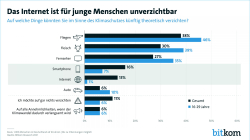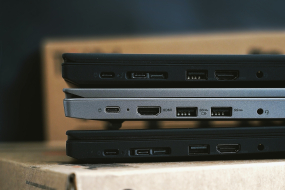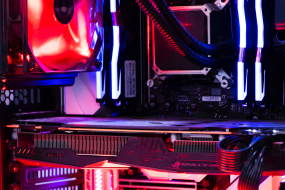Germans want more digital environmental protection
- 22 percent dispose of electronic appliances in their household waste due to a lack of knowledge
- Three quarters see digital transformation as a chance for the climate
- Flying, meat, television – this is what people are more ready to go without
- New Bitkom survey on digital transformation and the environment
Berlin, 21st October 2021 – Surfing the web, video streaming, writing emails: More than 60 million people in Germany use the internet – and thus indirectly produce significant amounts of CO2. However, many take precautions to limit climate effects or even to achieve a positive climate impact. Regarding the use of the internet and electronic devices, consumers are doing well – every second person has stopped using standby power, for example. However, there are also deficits. Correct disposal of scrapped electronic appliances, for example, where one fifth (22 percent) reports throwing them into household waste. Germans are calling on policy makers to make better use of the digital transformation to reach the sustainability goals. These are the results of a representative survey of 1,005 people in Germany aged 16 and above, which was commissioned by Germany’s digital industry association, Bitkom.
Results show that 61 percent already delete unnecessary emails, data, or apps on their devices to free up storage resources and to save energy. Half of them (51 percent) avoid using standby power, i.e., switch off electronic devices properly. 44 percent use the energy saving function on their laptops and screens whenever possible. One fifth (21 percent) reduces screen brightness to save energy, almost as many (19 percent) consciously opt for a smaller screen for this reason. Three quarters (74 percent) make sure to use devices for as long as possible before replacing them.
One third has auto-play deactivated
55 percent use LAN or wireless LAN instead of mobile data when going online – since they typically use less energy. To avoid playing unnecessary videos on streaming sites, every third respondent (35 percent) has the auto-play function deactivated. One third (35 percent) also unsubscribes from newsletter and cancels other email-based services. Streaming videos in lower resolution, which also means using less energy, is not yet a widespread habit: only 13 percent do so. 6 percent use ecological search engines or email providers, which operate their servers with renewable energy and invest parts of their revenues in environmental projects. 5 percent compensate for CO2 emissions using appropriate apps. “Using the internet and digital devices is a part of most people’s everyday lives. There is a growing awareness of the impact digital technologies have on the climate,” says Bitkom’s chief managing director, Dr. Bernhard Rohleder. “Scrutinising one’s own usage behaviour and making adjustments can make a significant contribution to protecting the climate.” The more sustainable and ecological Germany’s energy mix becomes, the more CO2 emissions could be reduced. “The new federal government should act quicker and more resolute in pushing for an energy mix, also because of the digital transformation,” says Rohleder. Most Germans agree: 9 out of 10 citizens (90 percent) demand a rapid expansion of renewable energy.
The internet is indispensable for young people
When asked about what they could most do without to protect the climate, 38 percent mention flying. 3 out of 10 (30 percent) would stop eating meat. A mere 16 percent could live without a smartphone – and only 13 percent without the internet. Young people aged 16 to 29 have different priorities to the rest of the population: While almost half of them (46 percent) could do without flying and 39 percent without meat, it is almost impossible for them to live without the internet (1 percent). Cars, on the other hand, are a high priority for all Germans: Only a minority of 6 percent (overall) and 10 percent (among those aged 16 to 29) could do without it.
What is the view of the population on how important the digital transformation is for the climate? Overall, three quarters (74 percent) hold the view that the digital transformation creates opportunities for the climate. 21 percent, however, stress the risks. 83 percent of the German population demand using all available technologies to lower CO2 emissions. 69 percent believe that the 1.5-degree goal cannot be reached without the digital transformation. “With digitisation, we hold a strong lever to quickly and effectively lower CO2 emissions,” says Rohleder. “In industry, sensors and smart machines lower energy demands to a minimum. Automated systems counter unnecessary heating and cooling of buildings. Videoconferencing and mobile work help to avoid business trips and commuting by car.”
Having said that, most citizens are particularly aware of the negative effects the digital transformation has on the climate: 94 percent agree with the statement that raw materials are exploited for producing technology devices. That same number (94 percent) see the production of electrical waste as a disadvantage. 89 percent say that digital technologies stimulate consumption – and 85 percent criticise the internet’s immense electricity consumption. Helping companies to save CO2 (87 percent) is the most widely mentioned advantage of digitisation, while 76 percent state that digital technologies help create new, climate-friendly business models. Another advantage, according to 55 percent, is that digital technologies can help consumers to save CO2. Every second respondent (49 percent) says: Digital technologies facilitate the Energiewende, Germany’s transition to clean energy. Rohleder: “It is important that we better highlight where and how digital solutions can save energy. The potential of digital technologies for saving CO2 is five times higher than its own footprint. The better informed policy makers, businesses, and consumers are, the better they can translate their knowledge into concrete measures – and help the climate.”
12 percent of Germans throw PC accessories into household waste
Smartphones, laptops, old TVs: Dealing with electronic waste is an important issue for Germans when protecting the climate and the environment. Nevertheless, many people struggle with proper disposal of their IT and electronic devices. According to 92 percent, having old devices lying around is a waste of valuable resources. However, 40 percent also admit to having many unused old devices in their household. 39 percent feel that proper disposal is too much effort – and 22 percent have disposed of an electrical device in their household waste because they didn’t know how to do it properly. Rohleder: “Protecting the environment lives off participation. But people can only participate if they know how to.”
38 percent of the people in Germany have indeed properly disposed of or passed on an IT device in the last 12 months. PC accessories like computer mouses, keyboards, and webcams have been thrown out by 17 percent, a smartphone by every eighth respondent (12 percent). One tenth (9 percent) have parted ways with a desktop computer and 7 percent with a television. Fewer people have disposed of computer screens (5 percent), printers/scanners (5 percent), gaming consoles (4 percent), laptops/tablets (3 percent each). However, they did not always do so properly: one eighth of those who disposed of PC accessories did so in their household waste (12 percent). All others either took their device back to their retailer (23 percent), to a recycling collection point or centre (32 percent) or gave away or sold their devices (23 percent). Devices that are more expensive by comparison, like smartphones, are more likely to be sold or given away (36 percent), taken to a recycling collection point or centre (35 percent), or taken back to the retailer (25 percent) than thrown in the household waste (1 percent). “Discarded devices do not belong in the household waste. Still functioning devices should be donated or sold, but defective devices must be disposed of properly,” stresses Rohleder. Since supermarkets and discount retailers will have to take back old devices starting in 2022, Bitkom expects the rate of return to increase significantly.
Maximising the potential of digital technologies for the climate
Every second respondent (49 percent) sees climate change as the biggest and most pressing problem of our time. For a further 27 percent, it is one of the most important problems. One tenth (11 percent) see it as one problem among many others, and 8 percent do not see climate change as a large problem at all. Only a minority of 3 percent hold the opinion that it does not exist. In view of future climate policy, a large majority of German citizens call for ambitious goals. A total of three quarters (74 percent) demand that Germany becomes climate-neutral before 2045: 19 percent want this by 2025, 35 percent by 2030, and 21 percent by 2040. One quarter (23 percent), however, is flatly opposed to bringing climate neutrality forward.
According to 86 percent of Germans, there should be government scheme for the sustainable digitisation of the economy. 82 percent demand that the public administration must become more digital to save paper and other resources. Bitkom’s chief managing director Dr. Bernhard Rohleder: “In 2020, Germany wants to emit 65 percent fewer greenhouse gases than in 1990. Out of all the instruments available, a broad digitisation scheme is the most effective.” Yet there are hardly any political incentives for companies to invest specifically in digital climate protection applications so far. “We need a programme that specifically promotes those digital technologies that create more sustainability. Technologies that have evident benefits for the climate and the environment, compared to traditional means, must be rolled out swiftly.”
- The Bitkom survey “Climate effects of digitisation”, published in spring 2021, has shown that Germany can achieve a large part of the necessary CO2 savings by accelerating the use of digital technologies. There is a great potential for savings in the areas of industry, mobility, and buildings. View survey: https://www.bitkom.org/klimaschutz
Methodology note: The basis of these data is a survey conducted by Bitkom Research and commissioned by Germany’s digital industry association, Bitkom. It included telephone surveys of 1,007 people older than 16 in August 2021. The survey is representative of the population.
Präsentation & Grafiken zum Download
Präsentation: "Nachhaltig durchs Netz: Wie klimabewusst sind die Deutschen in der digitalen Welt?"
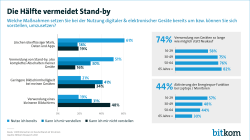
Web-Grafik: "Die Hälfte vermeidet Stand-by"
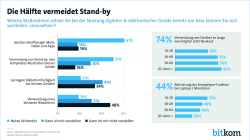
Print-Grafik: "Die Hälfte vermeidet Stand by"
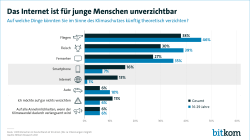
Web-Grafik: "Das Internet ist für junge Menschen unverzichtbar"
